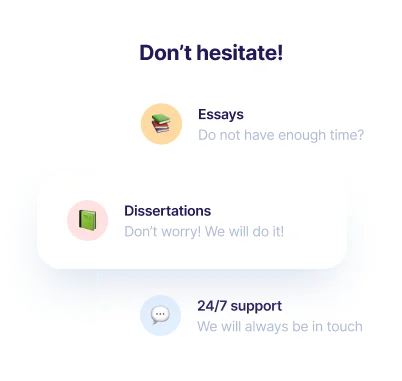Dissertation Conclusion On The Motivation Strategy For Supervisor With Respect To Student Training At SHMS
Remember! This is just a sample
You can get your custom paper by one of our expert writers
Get custom essay
Remember! This is just a sample
You can get your custom paper by one of our expert writers
Get custom essay
The following dissertation conclusion is not to use as your own piece. If you heed cheap dissertation help though, do not hesitate to order from us!
Effective identification of the critical issues provides a notion about the satisfaction level of the aims and objectives of the report. The aim of the report was to analyze the motivation strategy for supervisor with respect to student training at SHMS. On the other hand, the objectives of the report included a critique on literature review on motivation strategy in hospitality, investigation of the relationship between students and supervisors, and suggestions on how to motivate students better. In relation to the aims and objectives, various issues identified to cover the topic like hospitality curriculum and practical experience, role of supervisor in hospitality industry, the relationship between students and supervisors, training and supervision and motivation strategies used by the supervisors.
It has been learned that the importance of effective curriculum and practical experience is key to be successful in the marketplace. In addition, supervisors play key role in the hospitality industry as they act as leaders to select, mentor and train employees to enable them to fulfil their duties in an effective manner. It has also been learned that there is a direct and positive relationship between supervisors and students because supervisors as teachers develop working relationships with students that is the key element of training and is considered an experience. In addition, the importance of training in hospitality program was explored as it has been learned that training with academic course makes a program more effective and a standardized learning tool.
Furthermore, it has been learned that two-way communication, mutual reward theory, supervisor’s checklist, effective listening skills, flexibility, consistency in style and effective counselling are the key strategies that supervisors use to manage the students’ learning process and training. Moreover, they use different motivational and leadership styles like intrinsic and extrinsic factors to job satisfaction and transformational leadership to influence students to take part in training and to show a positive attitude to work to not only achieve their own goals but also organizational goals.
There were some key factors that have not been learned. For instance, different perspectives of students and supervisors on an individual basis have not been covered in relation to motivation strategy and its effects on them. It was not learned what strategies students find more attractive in performing duties and consider as effective learning and motivating tools to achieve their goals. On the other hand, supervisors’ perspectives about the students’ positive and negative attitudes to motivation strategies they use have not been covered. It is important to understand students and supervisors needs to develop an understanding and an effective teaching model in which both students and supervisors have an equal level of participation.
In addition, it was not leaned that how curriculum and practical training program as part of a motivation strategy should be developed to optimize the results. It was also not learned that to what extent students’ participation is important in designing curriculum and training programme to increase their level of motivation and to help supervisors to develop a trust. The aims and objectives of the report were not so feasible because they had weaknesses in terms of different areas. For example, the aim of the report should also include the study of effects of motivation strategy on the students along with study of motivation strategy for supervisor. Moreover, the objectives should be divided into different categories, such as role of curriculum and practical experience in the hospitality industry, role of supervisor and training, strategies used by supervisors and motivational and leadership tools. On the other hand, methodology used in the study was effective in answering the questions, but there were some limitations like a small sample size and participants were taken from only one restaurant. Hence, next time mixed methodology will be used to explore the topic in detail. Furthermore, the methodology uncovered the new knowledge, i.e. the participation of students in designing curriculum and training program. As training importance provided an overview that academic curriculum and practical training program should be aligned to the needs of students.
The main findings were that the supervisors play a teacher role during training of students. They use strategies like two-way communication, flexibility, mutual reward theory and listening skills to provide effective training to employees. Moreover, they use intrinsic and extrinsic factors and leadership style like transformational leadership to motivate students. One thing expected to find is the type of training material needs to be included to motivate students, but it could not be found. Nevertheless, overall research objectives of the study have been achieved.
19 April, 2023